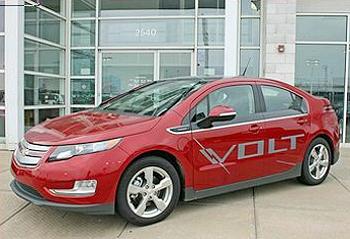
PHOENIX, Arizona, March 21, 2013 (ENS) – Patients with implanted cardiac devices such as pacemakers and defibrillators can safely drive or ride in an electric car without risk of electromagnetic interference, a Mayo Clinic study has concluded.
The first research of its kind to address the interaction between these medical devices and electric cars was presented at the 2013 American College of Cardiology annual scientific session in San Francisco on March 9.

The increasing prevalence of electric and hybrid cars, one of the fastest growing segments of the American automotive industry, prompted Mayo Clinic cardiac investigators to study the potential risk of the effects of EMI on patients with implantable devices.
A pacemaker is a medical device that uses electrical impulses, delivered by electrodes contacting the heart muscles, to regulate the beating of the heart. Over 100,000 pacemakers are implanted per year in the United States, according to the Gale Encyclopedia of Surgery.
The concern is that in some cases, implanted medical devices may sense signals from electrical or magnetic objects and misinterpret them as potential distress coming from the patient’s heart.
Luis R. Scott, M.D., cardiologist, and Fernando Tondato, M.D., cardiology fellow, both of Mayo Clinic in Arizona said that although the study results showed that the car tested did not generate clinically relevant amounts of electromagnetic interference and that the car is safe for patients with implanted devices, more research will help define and solidify the results.
“Further studies may be necessary to evaluate the interaction between implantable devices and other models of hybrid or electric cars,” said Dr. Scott, an associate professor of medicine at the Mayo Clinic.

The study was triggered by the question of one of Dr. Scott’s patients, who asked whether it would be safe to drive his hybrid after a device was implanted.
Mayo Clinic researchers used implantable devices from the three major manufacturers and a 2012 Toyota Prius hybrid in the study.
Electric and magnetic fields were measured in six positions: from the driver’s seat, front passenger seat, the left and right rear seats and in front of and behind the car from the outside.
Each position was evaluated at different speeds: 30 miles per hour, 60 mph and at variable speeds of acceleration and deceleration.
The 30 study participants with implanted devices were continuously monitored while rotating positions in the car and driving the car, with a particular focus on real-time detection of any interruption in the normal functionality of their devices.
A poster that summarizes the study, presented at the conference, was named a 2013 “Best Fellows In Training Poster,” by the American College of Cardiology.
The study was funded by the Mayo Clinic Center for Translational Science Activities. The study’s lead investigators called for additional research to extend and clarify their results.
Dr. Scott said, “We found that the devices were exposed to some degree of both electric and magnetic fields but the amount of interference did not really affect the normal functioning of their devices. Based on our study we found no reason to be concerned about riding in or driving a hybrid automobile.’
But then he said, “As a word of caution, I think that these results are applicable to the specific car that was tested, because different automobiles have different amounts of electric and magnetic fields generated that could potentially interfere with these devices.”
Copyright Environment News Service (ENS) 2013. All rights reserved.
© 2013, Environment News Service. All rights reserved. Content may be quoted only with proper attribution and a direct link to the original article. Full reproduction is prohibited.
